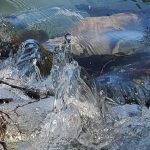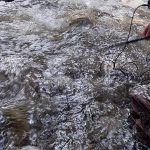New restoration program focusing on fish passage, Columbia Wetlands
Since March, the Living Lakes Canada (LLC) Restoration Program has been busy with early season planning, initial field work, and gearing up for late summer and fall projects. To date, LLC’s restoration work has been focused on assisting other groups with their projects while simultaneously developing an LLC-led internal program. Currently, there are two focus areas for the restoration program.
The first focus is on fish passage. The goal with these projects is to restore fish access to tributaries so they can utilize high value habitat and consequently have a higher resilience to climate effects. Road, rail and other stream crossings are prevalent across B.C. and and are often barriers to fish movement, limiting access to higher quality habitat.
LLC is:
- Part of the working group for the Elk River Watershed Connectivity Remediation Project. This group is facilitated by the Canadian Wildlife Federation and is in the early stages of developing a comprehensive plan to assess and remediate priority stream crossings to enhance connectivity for Westslope Cutthroat Trout in the Elk River Watershed near Fernie, B.C.
- Assisting with a fish passage project in the Bulkley River Watershed (near Smithers, B.C.) for the second year. The work will include completing barrier assessments, fish habitat confirmations, and sampling. We are excited to be a part of this project and are learning from all of the amazing local groups, regulators, governments and individuals including the Wet’suwet’en and Gitxsan First Nations on whose traditional territory the study area has been located for many years.. This project is only possible because of the incredible work completed by these groups over many years.
The other major focus is the Columbia River Wetlands in collaboration with the Columbia Wetland Stewardship Partners (CWSP). LLC has assisted with CWSP’s hydrologic vulnerability study for two years now, installing water level and temperature loggers throughout the wetlands.
- In May 2021, we assisted with the installation of over 40 sites in the wetlands between Invermere and Spillimacheen, B.C. Water quality measurements and samples were collected at all of the sites to understand changes between systems and possible groundwater influence.
This information paired with other existing datasets (eg. vegetative mapping) will help inform which are most vulnerable wetlands to climate change and where CWSP and LLC can investigate mitigation and enhancement solutions. The organizations will be investigating some potential solutions this fall including low-tech restoration options which may involve encouraging or supporting natural beaver activity.
In addition, LLC will investigate the state of cottonwood stands, regeneration status, beaver mitigation solution effectiveness (wire tree wraps mesh), and carry out additional installations where deemed necessary.
Please contact LLC Restoration Program Manager Kyle Prince with questions, comments, or collaborative projects. kyle@livinglakescanada.ca





